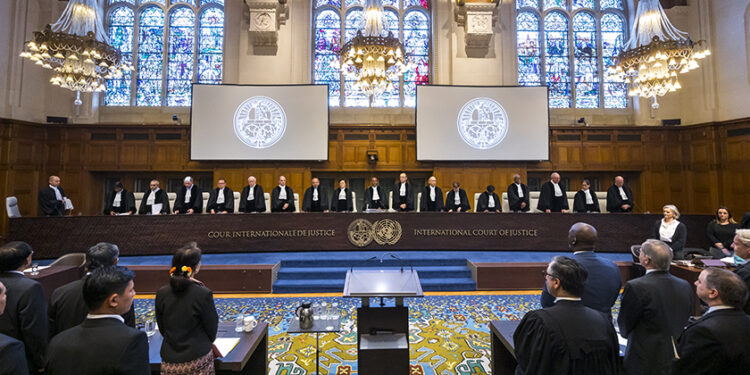YANGON—The International Court of Justice has announced the deadlines for initial pleadings in the genocide case The Gambia filed against Myanmar last year over its treatment of Rohingya Muslims.
More than 700,000 Muslims from Myanmar’s western Rakhine State fled to neighboring Bangladesh in late 2017 after the government’s security forces launched clearance operations in northern Rakhine State in response to a series of attacks by the Arakan Rohingya Salvation Army on police outposts. Those who fled said the Rohingya were subject to extrajudicial killings, rapes and arson by security forces. UN investigators said the operations had “genocidal intent”. Both the Myanmar government and military have denied the accusation.
The Gambia filed a case at the court in November on behalf of the Organization of Islamic Cooperation, accusing Myanmar of committing genocide against the Muslims from Rakhine State.
Last week, as requested by The Gambia, the ICJ ordered Myanmar to implement a number of provisional measures to protect Rohingya still living in the country. The court said the ruling would not influence the outcome of the main genocide case, in which the judges could take years to deliver a verdict.
On Tuesday, less than one week after the ruling, the UN’s top court announced that The Gambia must submit its initial pleading in the case by July 23, while Myanmar has until Jan. 25, 2021 to reply.
In fact, the deadlines are sooner than both parties requested. During their public hearings before the court in December last year, The Gambia asked for nine months to prepare its pleading, while Myanmar sought the same length of time to prepare its counter-pleading.
The ICJ announced the order effective Jan. 23, granting just six months’ preparation time to each party, “taking into account the exceptional circumstances of the case and its gravity.”
Kingsley Abbott, coordinator of the International Commission of Jurists’ Global Accountability Initiative, told The Irrawaddy that the court seems eager for the case to proceed without delay.
“The fact that the court, citing the ‘exceptional circumstances of the case and its gravity,’ gave the parties less time to file submissions than they requested tends to suggest it wishes to advance these proceedings as expeditiously as possible,” he said.
Following the ICJ’s ruling on provisional measures last week, Myanmar’s Ministry of Foreign Affairs said it took note of the decision, while reiterating its view that there was no genocide against the Rohingya, as alleged by The Gambia.
Furthermore, Myanmar State Counselor’s Office Minister U Kyaw Tint Swe reaffirmed the statement during a roundtable discussion about the case on state media on Tuesday.
“We need to submit evidence to the court to make clear it didn’t happen. We have hired the best legal team on the issue. They have accepted our case as they believe we didn’t commit [genocide],” he said.
You may also like these stories:
46 Rohingya Return to Myanmar’s Rakhine State
Myanmar Cannot Be Trusted on Rohingya Rights, ICJ Told
ICJ to Rule on Emergency Measures in Myanmar Genocide Case on Jan. 23: Gambia

















